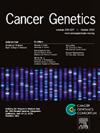Exploring the role of transcription factor TWIST1 in bladder cancer progression
IF 2.1
4区 医学
Q4 GENETICS & HEREDITY
引用次数: 0
Abstract
The transcription factor TWIST1 is a major regulator of Epithelial-Mesenchymal Transition, enhancing cancer cell mobility and invasive potential. Overexpression of TWIST1 is associated with tumor progression and poor prognosis. In our study, we explored the role of TWIST1 as both a prognostic biomarker and a therapeutic target in bladder cancer (BC), as well as the relationship between its promoter methylation and mRNA expression in bladder cancer patients. In cohort of 66 bladder cancer patients, we explored TWIST1 expression levels in tumor samples through RT-qPCR analysis;
Our findings revealed a significant correlation between high TWIST1 expression levels and advanced bladder tumor stages, grades, and progression; suggesting its association with aggressive BC phenotypes. Importantly, patients with low TWIST1 expression exhibited significantly prolonged disease-free survival (DFS), indicating its potential as a prognostic marker for stratification and as a therapeutic target in advanced BC. In contrast, there was no direct correlation between TWIST1 promoter methylation status and TWIST1 expression levels in BC tumors.
In summary, TWIST1 expression could play an important role as a molecular marker for BC patients’ prognosis and overall survival prediction. Moreover, our results suggest that TWIST1 promoter methylation doesn't affect the gene expression in BC. Furthermore, understanding the molecular mechanisms driving TWIST1 dysregulation may uncover novel therapeutic targets to improve the management of BC.
探讨转录因子TWIST1在膀胱癌进展中的作用。
转录因子TWIST1是上皮-间质转化的主要调节因子,增强癌细胞的移动性和侵袭潜力。TWIST1过表达与肿瘤进展和不良预后相关。在我们的研究中,我们探索了TWIST1作为膀胱癌(BC)预后生物标志物和治疗靶点的作用,以及其启动子甲基化与膀胱癌患者mRNA表达之间的关系。在66例膀胱癌患者队列中,我们通过RT-qPCR分析肿瘤样本中TWIST1的表达水平;我们的研究结果显示,TWIST1高表达水平与膀胱肿瘤的晚期分期、分级和进展之间存在显著相关性;提示其与侵袭性BC表型有关。重要的是,TWIST1低表达的患者表现出显著延长的无病生存期(DFS),这表明它有可能作为分层的预后标志物和晚期BC的治疗靶点。相比之下,在BC肿瘤中,TWIST1启动子甲基化状态与TWIST1表达水平之间没有直接相关性。综上所述,TWIST1的表达可以作为BC患者预后和总生存预测的分子标志物发挥重要作用。此外,我们的研究结果表明TWIST1启动子甲基化不影响BC中的基因表达。此外,了解驱动TWIST1失调的分子机制可能会发现新的治疗靶点,以改善BC的管理。
本文章由计算机程序翻译,如有差异,请以英文原文为准。
求助全文
约1分钟内获得全文
求助全文
来源期刊

Cancer Genetics
ONCOLOGY-GENETICS & HEREDITY
CiteScore
3.20
自引率
5.30%
发文量
167
审稿时长
27 days
期刊介绍:
The aim of Cancer Genetics is to publish high quality scientific papers on the cellular, genetic and molecular aspects of cancer, including cancer predisposition and clinical diagnostic applications. Specific areas of interest include descriptions of new chromosomal, molecular or epigenetic alterations in benign and malignant diseases; novel laboratory approaches for identification and characterization of chromosomal rearrangements or genomic alterations in cancer cells; correlation of genetic changes with pathology and clinical presentation; and the molecular genetics of cancer predisposition. To reach a basic science and clinical multidisciplinary audience, we welcome original full-length articles, reviews, meeting summaries, brief reports, and letters to the editor.
 求助内容:
求助内容: 应助结果提醒方式:
应助结果提醒方式:


